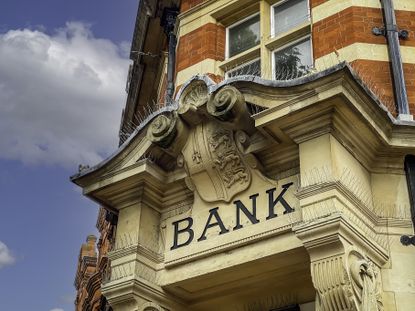FCA tells banks to speed up savings rate increases
Record profits and low savings rates spurred the FCA to meet with some of the UK’s top banks.


The Financial Conduct Authority (FCA) has told some of the country’s biggest banks to boost progress on improving savings rates for customers amid accusations of profiteering.
Currently, the top savings accounts are offering rates of up to 7% for existing customers, but the industry average is well below this.
Following a meeting with bank bosses, including those from HSBC, Barclays, Lloyds and NatWest, the regulator said the lenders recognised they “needed to do more to help their consumers access the best rates.”
Subscribe to MoneyWeek
Subscribe to MoneyWeek today and get your first six magazine issues absolutely FREE

Sign up to Money Morning
Don't miss the latest investment and personal finances news, market analysis, plus money-saving tips with our free twice-daily newsletter
Don't miss the latest investment and personal finances news, market analysis, plus money-saving tips with our free twice-daily newsletter
But Sheldon Mills, FCA executive director for competition, said "It's not for me to set rates for banks."
Banks under pressure due to low savings rates
Despite the soaring cost of loans and mortgages, banks have been attacked for not passing higher interest rates onto savers.
According to Moneyfacts, the average two-year fixed mortgage rate is 6.52%, with the savings rate on offer from some high street banks well below that figure. Despite increases in recent days, the average one-year fixed savings rate is 4.83%.
The FCA said: “We have started to see some positive action by banks and building societies to improve their rates, and to ensure their customers are benefiting from better value products. We now want to see that progress accelerate.”
The meeting comes ahead of the Consumer Duty roll out - a new string of regulations the FCA said will “put consumer interests at their heart… to ensure their customers are benefiting from better value products.”
High street banks are also facing pressure from MPs. Earlier this week, the cross-party Treasury Committee wrote to the banks asking whether they believe all their savings rates “provide fair value” to customers.
Dame Angela Eagle, a member of the Treasury Committee, said: “This blatant profiteering has been shocking, and it’s clear to me this behaviour is miles away from the incoming requirement for firms to treat their customers fairly and with respect.”
"With interest rates on the rise and our constituents feeling squeezed by rising prices, it is only right that the UK's biggest banks step up their measly easy-access savings rates," Harriett Baldwin, chair of the committee, said in a statement.
Banks boost rates in response
The good news is, banks seem to be getting the message. Ahead of the meeting with the FCA, HSBC unveiled a 0.65% increase on Fixed Rate Saver accounts - its one-year Fixed Rate Saver increased to 5.05% and two-year Fixed Rate Saver is now 5.1%.
Lloyds is also boosting its rates across its Fixed Rate Cash ISAs from 12 July. Its one-year fix will increase by half a percentage point to 5.45%, with its two-year fix rising to 5.5%.
But any reprieve in cash savings rates is “being drowned out by the stubborn persistence of high inflation,” said Myron Jobson, senior personal finance analyst at interactive investor.
“Those who can afford to put money away for five years or more should consider investing for the potential of long-term inflation-beating returns that far outstrip savings rates,” he said.
Compounding the problem is the issue of inertia, with many savers not shopping around for better rates. £250 billion is sitting in bank and building society accounts paying no interest, while £945 billion is in instant access accounts.
At the same time, banks are recording booming profits.
NatWest reported a 50% bump in profits during the first quarter of 2023 to £1.9bn, while Lloyds filed a pre-tax profit of £2.26 billion, up 46.4% year on year. Barclays reported pre-tax profits of £2.6 billion, up 27%. HSBC meanwhile tripled its quarterly profits to $12.9bn.
In a statement issued alongside its quarterly report, HSBC said the surging profits were a result of “higher net interest income in all of our global businesses due to interest rate rises.”
Tom is a journalist and writer with an interest in sustainability, economic policy and pensions, looking into how personal finances can be used to make a positive impact.
He graduated from Goldsmiths, University of London, with a BA in journalism before moving to a financial content agency.
His work has appeared in titles Investment Week and Money Marketing, as well as social media copy for Reuters and Bloomberg in addition to corporate content for financial giants including Mercer, State Street Global Advisors and the PLSA. He has also written for the Financial Times Group.
When not working out of the Future’s Cardiff office, Tom can be found exploring the hills and coasts of South Wales but is sometimes east of the border supporting Bristol Rovers.
-
-
 Top-quality small companies with big scope for long-term growth
Top-quality small companies with big scope for long-term growthA professional investor tells us where he’d put his money. This week: Dr Gareth Blades, analyst at Amati Global Investors, highlights three favourites.
By Nicole García Mérida Published
-
 Starling Bank hikes fixed savings rate to 5.25%
Starling Bank hikes fixed savings rate to 5.25%Starling Bank has hiked the rate on its fixed savings which has shot up from 3.25% to 5.25% - but how does it compare to the rest of the market?
By Vaishali Varu Published

